
Please note we are intending to offer simultaneous translation into Arabic at this event.
About the Lecture:
The ACOR Photo Archive contains rich collections of tens of thousands of photographs, but its reach also extends far beyond the images themselves. ACOR’s archival collections reflect the seismic shifts that have occurred in the region over the past 80 years, including early black-and-white photos of 1940s Amman, rare color slides of the technological and development boom of the 80s, and photographs of heritage sites that have since been damaged by conflict in Iraq, Syria, and Yemen in the last decade. Newly digitized, these images and their associated metadata provide an especially valuable frame of reference with which to understand Jordanian heritage, demonstrating many applications within academic research and among cultural heritage professionals. In addition, given the rapid urban development Jordan has experienced within the past 30 years, the photos document social change in cities such as Amman and Aqaba and provide new generations access to alternative views of these places within living memory. The ACOR Photo Archive Project is driven by the values of sustainability and accessibility, and in order to make ACOR’s archival efforts sustainable in the long term, the Project trains Jordanian graduates in photo digitization and hosts workshops attended by Jordanian national and international heritage institutions. The ACOR Photo Archive Project is funded by the United States Department of Education (Title VI grant; 2016 – 2020).
We hope to see you there!
Background: About the ACOR Photo Archive Project
The ACOR Photo Archive collections is interdisciplinary, featuring works of interest to a broad range of specializations including anthropology, architecture, urban studies, history and art history, conservation, economics, geography and cultural heritage studies. Each of the 25,000 photos online is described in detail, and the growing number of Arabic language references continue to improve bi-lingual search capabilities within the free, online database. Please note you can read more online, search the collection yourself, and follow project highlights on Instagram.
About the Lecturers:
 Jessica Holland is the ACOR Archivist. Her work specializes in Digital Curation and outreach activities as part of a long-term strategy to make ACOR’s significant archival holdings more accessible to the public. Jessica’s background is in art history, curation and museums. Jessica received her B.A. from the University of Cambridge in History of Art (2013), and her M.A. from SOAS, University of London in Near and Middle Eastern Studies with Intensive Arabic, submitting her thesis within the digital humanities field (2018).
Jessica Holland is the ACOR Archivist. Her work specializes in Digital Curation and outreach activities as part of a long-term strategy to make ACOR’s significant archival holdings more accessible to the public. Jessica’s background is in art history, curation and museums. Jessica received her B.A. from the University of Cambridge in History of Art (2013), and her M.A. from SOAS, University of London in Near and Middle Eastern Studies with Intensive Arabic, submitting her thesis within the digital humanities field (2018).

Jack Green joined ACOR as the Associate Director in October 2017. He supports ACOR’s activities, including the USAID SCHEP project. He also serves as the project director of the Temple of the Winged Lions Cultural Resource Management Initiative (TWLCRM) at Petra and co-Project Lead of the ACOR Photo Archive Project. Jack Green’s academic and professional background is in ancient Near Eastern archaeology, cultural heritage, and museums. He was curator of Ancient Near East at the Ashmolean Museum, University of Oxford (2007–11), chief curator of the Oriental Institute Museum, University of Chicago (2011–15), and deputy director at the Corning Museum of Glass. Jack Green received his B.A. degree from the University of Liverpool (1999) and M.A. and Ph.D from the Institute of Archaeology, University College London (2001, 2006 respectively).
RSVP and receive additional event updates on Facebook.
For the full email invitation, including other ACOR announcements, please click here.

